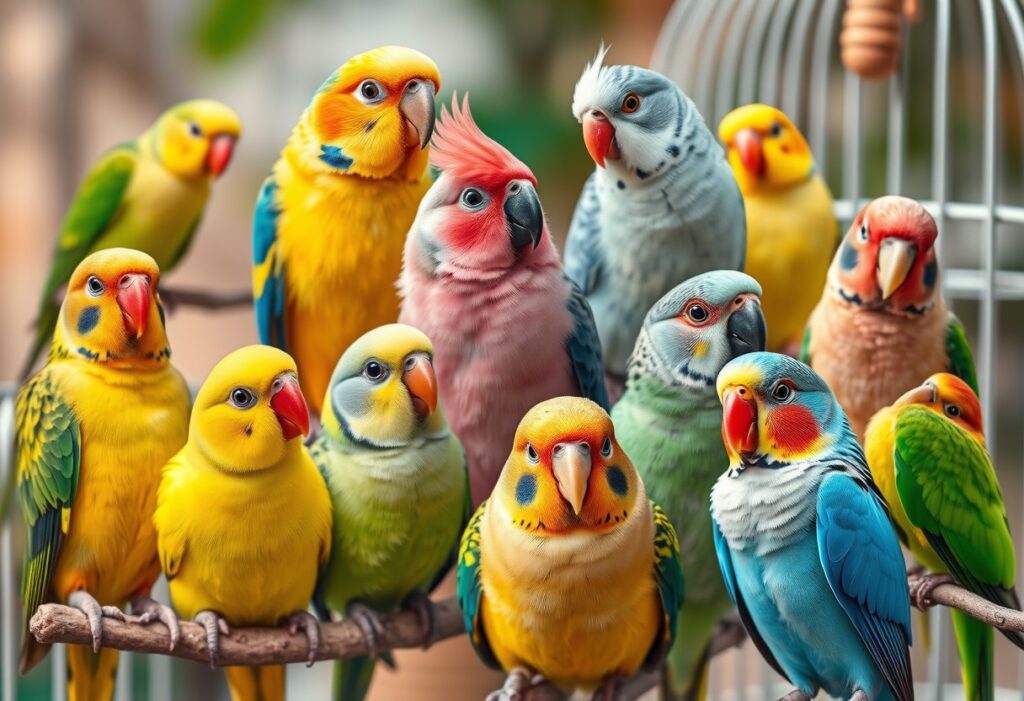Most pet birds are social creatures that thrive on interaction, and when they feel lonely, it can lead to stress and behavioral problems. Understanding your feathered friend’s needs is crucial to ensuring their well-being. In this guide, you will discover effective strategies to enrich your bird’s environment and strengthen your bond, ultimately helping them feel happier and less isolated. Whether you have a single bird or multiple, these tips will assist you in creating a supportive atmosphere where your avian companion can flourish.


Understanding Bird Loneliness
Before stepping into the strategies for helping your feathered friend cope with loneliness, it’s crucial to understand the concept of bird loneliness itself. Birds are social creatures by nature, and when they are isolated, they can experience feelings of distress and isolation. During their natural behaviors in the wild, they thrive on interaction, social bonding, and communication within their flocks. If you have a pet bird, it’s important to recognize that their emotional needs should be met just as much as their physical ones.
Signs Your Bird is Lonely
Some notable signs that your bird is feeling lonely may include a lack of interaction, increased vocalizations, or changes in behavior. You might notice your bird becoming withdrawn, showing less interest in toys, or failing to engage with you when you try to interact. Increased screeching, chirping, or an unusual silence can also be indicative of your bird’s emotional state, signaling that they may be looking for companionship or are unsettled in their environment.
Factors Contributing to Loneliness
Clearly, several factors can contribute to your bird’s loneliness. These can include the absence of social interaction, sudden changes in their environment, or a lack of stimulation from both human interaction and available toys. Some birds may become more lonely when they are not provided with opportunities for play or when their human companions are frequently away. Factors such as overweaning, which leads to strong dependency, can also intensify feelings of loneliness.
- Absence of social interaction
- Changes in environment
- Lack of stimulation
This understanding is crucial for recognizing how best to provide support and companionship for your bird. Recognizing these factors can assist you in creating a nurturing and satisfying environment for your pet.
Birds have a unique set of social needs that are often overlooked. It’s important to remember that your bird’s loneliness can stem from a variety of factors, including changes to their routine or the introduction of new pets into the household. A lack of interaction with other birds, particularly for species that thrive in flocks, significantly affects their emotional well-being. Providing ample socialization and environmental enrichment is integral to maintaining an emotionally healthy bird.
- Changes to their routine
- Inclusion of new pets
- Lack of interaction with other birds
Recognizing these factors can greatly enhance your ability to support your bird in coping with feelings of loneliness.
How to Support Your Bird
Now that you understand the significance of addressing your bird’s feelings of loneliness, it’s time to explore various methods to support your feathered friend. The well-being of your bird will greatly improve if you take the appropriate steps to ensure they have companionship, engage in fulfilling activities, and establish a stable routine. These elements are crucial in helping your bird thrive both emotionally and physically.
Providing Companionship
For many birds, social interaction is vital to their happiness and overall health. If you notice your bird is exhibiting signs of loneliness, such as excessive vocalization or plucking feathers, it might be time to consider introducing a companion. Accurately choosing the right type of companion is critical; ideally, this would be another bird of a compatible species. Ensure that you allow ample time for both birds to acclimate to each other and supervise their interactions closely to prevent any aggression.
Ultimately, your presence can also be a significant source of companionship. Spend quality time with your bird daily, engaging in activities like talking, singing, or teaching new tricks. Your attention will not only help to alleviate their loneliness but also strengthen the bond you share, making them feel loved and secure.
Enrichment Activities and Toys
Support your bird’s emotional well-being by providing a variety of stimulating toys and enrichment activities to keep them occupied. Birds are naturally curious creatures that require mental stimulation to prevent boredom. Offer a range of toys, such as puzzles, ropes, and foraging toys, which encourage your bird to engage in play and exploration. Rotate these toys regularly to maintain their interest and ensure that your bird always has something exciting to interact with.
Incorporating daily activities that mimic natural behaviors can also be extremely beneficial. Provide opportunities for your bird to forage for food, which encourages problem-solving and keeps their mind alert. Regular physical activity is equally important, so create a safe space for your bird to fly or climb around, helping to prevent feelings of confinement and staleness in their environment.
With the right enrichment activities, you create a stimulating environment that distracts your bird from loneliness and promotes healthy behaviors. Your efforts in providing varied and engaging toys will not only brighten their day but also foster their cognitive and physical development.
The Importance of Routine
Even though birds are adaptable creatures, establishing a consistent daily routine can significantly enhance their emotional well-being. Your bird thrives on predictability, and having set times for feeding, play, and social interaction creates a sense of security. This routine can help alleviate anxiety and provide your bird with a comforting structure to their day.
Incorporating routines into your bird’s life may involve dedicating specific times for play sessions, meal times, or time spent outside of their cage. This balance of activity and quiet time can prevent feelings of overstimulation or fatigue. By consistently implementing these routines, you help your bird feel more at ease in their environment.
This predictable structure not only reduces stress but also improves your bird’s confidence as they come to anticipate the day’s events. As you continue to provide these vital stabilizing elements, you’ll likely find that your bird exhibits a happier and more relaxed demeanor.

Expert Tips for Bird Loneliness
Not every bird can cope easily with loneliness, especially social species that thrive on interaction. To ensure your feathered friend maintains their happy disposition, consider these expert tips:
- Provide a companion bird for socialization.
- Engage in daily interactions to strengthen your bond.
- Create a stimulating environment with toys and perches.
- Monitor signs of stress or loneliness in your bird.
- Establish a routine that includes playtime and training.
Choosing the Right Companion Bird
Any time you consider adding a second feathery friend to your household, it is important to choose a compatible species that can provide the social interaction your bird craves. Research different species that have similar temperaments and compatibility with your current bird, as not all birds will get along. It’s also prudent to find a companion of a similar age, size, and energy level to ensure a harmonious environment.
In addition to compatibility, consider the social needs of the potential companion. Some birds enjoy the company of others and will benefit significantly from having a mate—whereas others may prefer solitude. Pay close attention to your bird’s personality traits and choose a companion that complements them.
Socializing with Your Bird
Birds are inherently social creatures, and as such, they require regular interaction to stave off feelings of loneliness. Create a playful and engaging atmosphere where you can spend time with your bird outside of their cage. Simple activities like talking, singing, or even playing games can significantly enhance your relationship.
Birds also thrive on routine, so establishing a daily schedule that includes playtime and bonding moments can serve to strengthen your connection and raise their overall happiness. Let your bird take part in various activities around the house, maintaining a close watch on them to ensure their safety and well-being.
With consistent socialization, your bird will feel more secure, reducing the chance of loneliness and anxiety. The more time you invest in building this bond, the more trust and affection you will cultivate between you and your bird.
Creating a Comfortable Environment
One of the most effective ways to minimize your bird’s loneliness is by creating a comfortable and enriching environment. This includes providing a spacious cage filled with perches, toys, and stimulating activities that will keep your bird engaged and entertained, even when you’re not around. A variety of textures, colors, and sizes will add to your bird’s sense of curiosity and exploration.
Additionally, consider placing the cage in a common area of your home so your bird can observe family activities and feel included. Regularly rotate toys and introduce new items to prevent boredom and keep your bird inquisitive and interested in their surroundings.
Socializing your bird is just as crucial as providing a comfortable environment. Make sure to spend time each day interacting with your bird and providing new experiences to keep their spirits high.
Conclusion
The impact of loneliness on your bird’s well-being cannot be understated, and as a responsible pet owner, it is your duty to ensure they feel secure and loved. By implementing interactive playtime, ensuring a stimulating environment, and considering companionship through either another bird or quality time with you, you can make significant strides in alleviating their feelings of isolation. Utilize toys, perches, and challenges that encourage exploration and mental engagement, allowing your bird to flourish mentally and physically.
Do not forget, your bird relies on you for their emotional needs, much like any other pet. Monitor their behavior for signs of distress or boredom, and adjust your approach accordingly. By being attentive to your bird’s needs and providing consistent interaction, you create a nurturing environment that fosters happiness and health. In doing so, you not only enhance your bird’s quality of life but also enrich your bond, leading to a more fulfilling companionship.
FAQ
Q: How can I tell if my bird is feeling lonely?
A: Birds are social creatures, and signs of loneliness can manifest through changes in behavior. Look for indicators such as excessive vocalization, feather plucking, lethargy, or loss of appetite. If your bird is quieter than usual or seems disinterested in activities they typically enjoy, it may be feeling lonely. Keeping an eye on their interactions and overall demeanor will help you gauge their emotional state effectively.
Q: What can I do to keep my bird company when I am not home?
A: There are several strategies to help your bird feel less lonely when you are away. Consider providing stimulating toys that encourage play and reduce boredom. You can also leave a radio or TV on, as the background noise can make your bird feel less isolated. If possible, you might opt for a second bird to keep your pet company, but ensure that both birds are compatible before introducing them. Additionally, creating a safe, enriching environment with perches, swings, and interaction opportunities will help alleviate loneliness.
Q: How does socialization benefit my bird’s mental health?
A: Socialization plays a crucial role in a bird’s mental well-being. Regular interaction with humans or other birds prevents feelings of boredom and can significantly reduce stress and anxiety. Engaging your bird through activities like training, shared playtime, and positive reinforcement can foster a strong bond between you and your pet, enhancing their happiness. Remember to also watch for signs of distress and adjust your socialization efforts accordingly, as each bird has its own comfort level with interaction.









